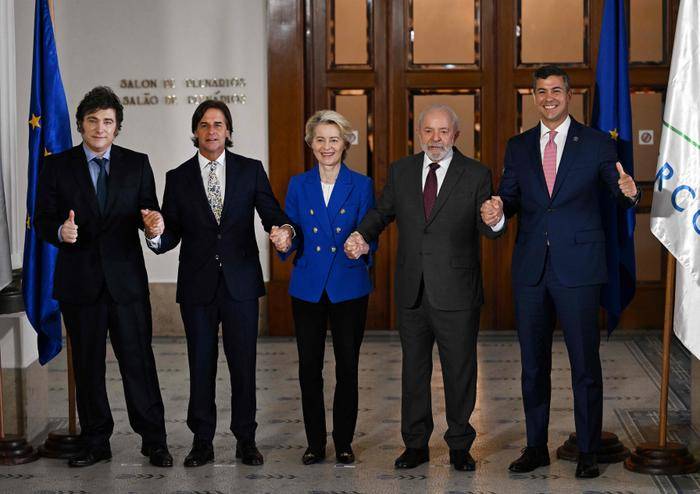EU and Mercosur Sign Historic Free Trade Agreement, Paving the Way for Increased Economic Cooperation
In a landmark moment for global trade, the European Union (EU) and Mercosur, a South American trade bloc, have concluded a comprehensive free trade agreement. The deal, which was finalized after 20 years of negotiations, is set to boost economic cooperation between the two regions and create new opportunities for businesses, farmers, and consumers.
The agreement, which was signed by EU Trade Commissioner Cecilia Malmström and Mercosur's ministers, covers a wide range of areas, including trade in goods, services, and investment. It also includes provisions on sustainable development, labor rights, and environmental protection.
"This agreement is a major milestone in our trade relations with Mercosur," said EU Trade Commissioner Cecilia Malmström. "It will create new opportunities for our businesses, farmers, and consumers, and will help to strengthen our economic ties with this important region."
The agreement is expected to have a significant impact on trade between the EU and Mercosur. The EU is Mercosur's second-largest trading partner, accounting for around 20% of the bloc's total trade. Mercosur, which comprises Argentina, Brazil, Paraguay, and Uruguay, is the EU's 10th-largest trading partner.
The agreement includes a number of key provisions that will help to boost trade and economic cooperation between the EU and Mercosur. These include:
- _Tariff Reductions_: The agreement will eliminate tariffs on 91% of EU exports to Mercosur, and 92% of Mercosur exports to the EU.
- _Services Liberalization_: The agreement will liberalize trade in services, including financial services, telecommunications, and tourism.
- _Investment Protection_: The agreement will provide strong protection for EU and Mercosur investors, including provisions on expropriation, national treatment, and dispute settlement.
- _Sustainable Development_: The agreement includes provisions on sustainable development, including commitments to uphold international labor and environmental standards.
The agreement has been welcomed by leaders from both the EU and Mercosur. EU Commission President Jean-Claude Juncker described the agreement as a "major achievement" that will help to strengthen economic ties between the two regions.
Mercosur's ministers also welcomed the agreement, saying that it will help to boost economic growth and development in the region. "This agreement is a major step forward for Mercosur and will help to strengthen our economic ties with the EU," said Argentina's Minister of Foreign Affairs, Jorge Faurie.
,
While the agreement is a significant step forward for EU-Mercosur relations, there are still challenges ahead. The agreement must be ratified by the EU's member states and the Mercosur countries, which could take several months.
There are also concerns about the impact of the agreement on certain sectors, such as agriculture and manufacturing. Some EU farmers have expressed concerns about the impact of increased competition from Mercosur farmers, while some Mercosur manufacturers have expressed concerns about the impact of increased competition from EU manufacturers.
The EU-Mercosur free trade agreement is a significant step forward for economic cooperation between the two regions. The agreement has the potential to boost trade and economic growth, and to strengthen economic ties between the EU and Mercosur. However, there are still challenges ahead, and it will be important for both sides to work together to address these challenges and ensure that the agreement is implemented successfully.



No comments yet
Be the first to share your thoughts!